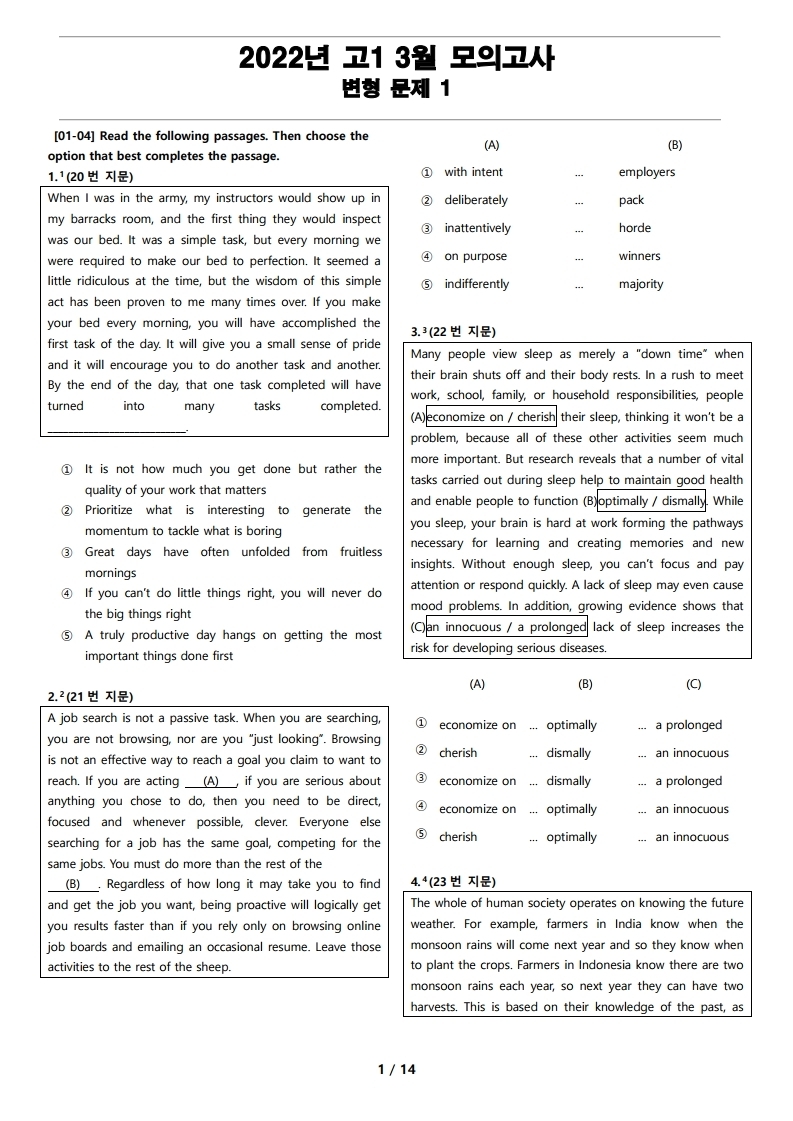2022년 고1 3월 전국 연합 모의고사
변형 문제 1
2022년 고1 3월 전국 연합 모의고사 변형 문제 1
출판사에서 오랫동안 영어 번역과 교정을 하셨던 원어민 선생님과
현직에서 강사를 하고 있는 연구진들이 학생들을 위한 최상의
2022년 고1 3월 전국 연합 모의고사 변형 문제 1 을 선보입니다.
사고력과 이해력을 요구하는 문제들로 내신 대비 뿐만이 아니라
수능도 한꺼번에 공부하실 수 있는 자료입니다.
중간고사&기말고사 전에 더메이킹스(The Makings)에서 제작한
2022년 고1 3월 전국 연합 모의고사 변형 문제로 마무리 하세요.
정답 확인하러가기!
2022년 고1 3월 전국 연합 모의고사 변형 문제 1
2022년 고1 3월 전국 연합 모의고사 변형 문제, 내신대비, 영어내신자료,고등영어자료, 모의고사 변형문제,전국 연합모의고사 변형자료, 모의고사 영어 서술형 대비, 대치동 고등 영어자료, 대치
themakings.co.kr
themakings.co.kr
The Makings의 2022년 고1 3월 전국 연합 모의고사 변형 문제는
총 11개의 유형으로 구성되어 있습니다.
1. 빈칸 채우기(객관식)
2. 글의 내용 일치/불일치(객관식/한글 선택지)
3. 글의 내용 일치/불일치(객관식/영어 선택지)
4. 글 끼어 넣기(객관식)
5. 어법(서술형)
6. 어휘(서술형)
7. 주제문(객관식/영어 선택지)
8. 어휘 빈칸 채우기(서술형)
9. 영작(서술형)
10. 요약문 완성하기(서술형)
11. 문단 재배열 하기(객관식)
더메이킹스(The Makings)가 제작한
2022년 고1 3월 전국 연합 모의고사 변형 문제 1의 지문입니다.
1번 지문(문항 번호 20번)
When I was in the army, my instructors would show up in my barracks room, and the first thing they would inspect was our bed. It was a simple task, but every morning we were required to make our bed to perfection. It seemed a little ridiculous at the time, but the wisdom of this simple act has been proven to me many times over. If you make your bed every morning, you will have accomplished the first task of the day. It will give you a small sense of pride and it will encourage you to do another task and another. By the end of the day, that one task completed will have turned into many tasks completed. If you can’t do little things right, you will never do the big things right.
2번 지문(문항 번호 21번)
A job search is not a passive task. When you are searching, you are not browsing, nor are you “just looking”. Browsing is not an effective way to reach a goal you claim to want to reach. If you are acting with purpose, if you are serious about anything you chose to do, then you need to be direct, focused and whenever possible, clever. Everyone else searching for a job has the same goal, competing for the same jobs. You must do more than the rest of the herd. Regardless of how long it may take you to find and get the job you want, being proactive will logically get you results faster than if you rely only on browsing online job boards and emailing an occasional resume. Leave those activities to the rest of the sheep.
3번 지문(문항 번호 22번)
Many people view sleep as merely a “down time” when their brain shuts off and their body rests. In a rush to meet work, school, family, or household responsibilities, people cut back on their sleep, thinking it won’t be a problem, because all of these other activities seem much more important. But research reveals that a number of vital tasks carried out during sleep help to maintain good health and enable people to function at their best. While you sleep, your brain is hard at work forming the pathways necessary for learning and creating memories and new insights. Without enough sleep, you can’t focus and pay attention or respond quickly. A lack of sleep may even cause mood problems. In addition, growing evidence shows that a continuous lack of sleep increases the risk for developing serious diseases.
4번 지문(문항 번호 23번)
The whole of human society operates on knowing the future weather. For example, farmers in India know when the monsoon rains will come next year and so they know when to plant the crops. Farmers in Indonesia know there are two monsoon rains each year, so next year they can have two harvests. This is based on their knowledge of the past, as the monsoons have always come at about the same time each year in living memory. But the need to predict goes deeper than this; it influences every part of our lives. Our houses, roads, railways, airports, offices, and so on are all designed for the local climate. For example, in England all the houses have central heating, as the outside temperature is usually below 20°C, but no airconditioning, as temperatures rarely go beyond 26°C, while in Australia the opposite is true: most houses have airconditioning but rarely central heating.
'전국 연합 모의고사 변형 문제 > 고1 모의고사 변형 문제' 카테고리의 다른 글
| 2022년 고1 6월 전국 연합 모의고사 변형 문제 2 (0) | 2023.02.17 |
|---|---|
| 2022년 고1 3월 전국 연합 모의고사 변형 문제 3 (0) | 2023.02.10 |
| 2022년 고1 11월 전국 연합 모의고사 변형 문제 5 (0) | 2022.11.30 |
| 2022년 고1 11월 전국 연합 모의고사 변형 문제 4 (0) | 2022.11.28 |
| 2022년 고1 11월 전국 연합 모의고사 변형 문제 3 (0) | 2022.11.27 |
